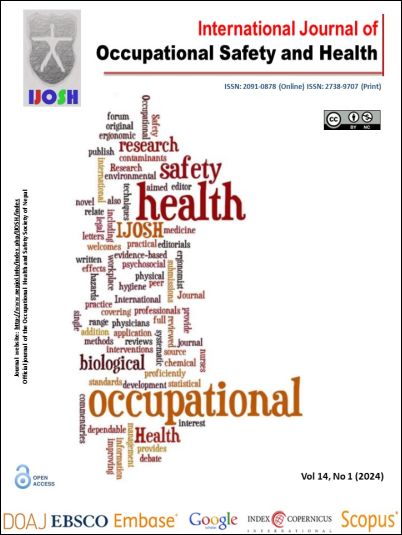Assessment of self-perceived risk and risk rating among chemical sprayers in selected tea plantations in South India
DOI:
https://doi.org/10.3126/ijosh.v14i1.46251Keywords:
Chemical sprayer, Risk rating, Tea plantationAbstract
Introduction: Chemical sprayers of the tea plantation industry perceive various degrees of risk involved in their daily work. The objective of the study was to assess self-perceived risk and to rate these risks among the pesticide sprayers working in selected tea plantations in South India.
Methods: A cross-sectional study was conducted among 290 chemical sprayers in six selected tea plantations in South India from September to October 2018 after approval from the Institutional Ethics Committee and permission from the plantations. Data was collected by structured interview schedule with the chemical sprayers and key informant interviews were conducted with their supervisors. The risks perceived by the sprayers were rated and expressed using the Risk Rating Matrix.
Results: The mean age of the participants was 45.6±8.5 years and all of them were males. The most common risks encountered were leech bites (76%), other insect bites (58%) and bruises (46%). Chemical spills, splashes, slips, falls and backaches were considered as minor hazards in risk rating. Animal attacks and falls from trees were assigned the highest risk rating scores.
Conclusion: Insect bite was the most common risk perceived and animal attacks attained the highest risk score. Regular supervision and monitoring of work-related risk factors can help in the reduction of common injuries thereby ensuring safety at the workplace.
Downloads
Downloads
Published
How to Cite
Issue
Section
License
Copyright (c) 2023 Radhika Kannan, Naveen Ramesh

This work is licensed under a Creative Commons Attribution-NonCommercial 4.0 International License.
This license enables reusers to distribute, remix, adapt, and build upon the material in any medium or format for noncommercial purposes only, and only so long as attribution is given to the creator.





